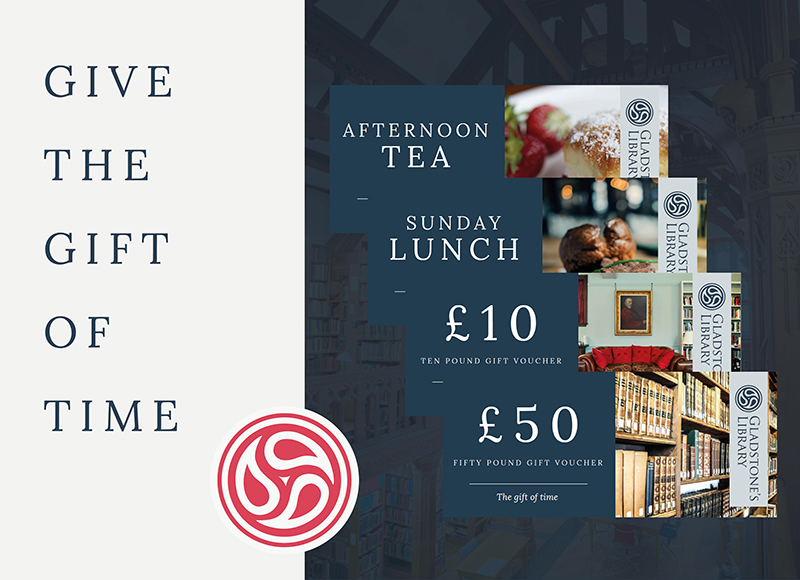
The Great War: 100 Years On
The month of November 2018 marks the 100th anniversary of the end of the First World War, which was achieved with the Armistice of 11th November 1918. Remembrance of this day, and of all those fallen during the years beforehand, remains an important practice throughout the United Kingdom, and the centenary provides us an opportunity to partake in this through our collections here at Gladstone’s Library.
The items selected all originate from the war-time era itself and this sets them aside from the vast expanse of literature that the conflict has been subject to since its conclusion. From these contemporary viewpoints, we can gauge the thoughts, opinions and feelings of those affected on a much more vivid and rational level, without the interference of hindsight and appraisal. This therefore paints us as the reader of a distinctly more human picture of what will no doubt be remembered as one of the most jarring and difficult time-periods in all history.
What the British Lioness would do
International Militancy. A Speech delivered by Christabel Pankhurst at the Carnegie Hall, New York, on January 13th (London, 1915) [classmark 8/E/12]
Prominent suffragette and activist Christabel Pankhurst details her assessment on the state of the war to an audience in New York. The suffragist movement’s disruptive activities towards the Government had been indefinitely postponed due to the emergence of a 'common enemy', but this did not mean the fight for equality had been ceased, rather instead allowing Pankhurst to take her influence to the American stage. Here she talks at length about current issues, particularly with regard to the fundamental need for international peace, but stresses that this must be achieved under the correct terms and circumstances for true liberty to prevail.
“Stand for the right, and have the courage as women to pay the terrible price that has always had to be paid for freedom in this world, and will always have to be paid so long as tyrants walk abroad.” (p.15)
Man does not live by bread alone
The Y.M.C.A and the War, Charles T. Bateman (London, 1915) [classmark 8/F/5]
This pamphlet sees Charles T. Bateman describe his visit to a Y.M.C.A hut situated in Northern France, one of many in that area, as well as on British soil. These huts served as a crucial escape from the grim realities of being at war, providing hot food, comfortable surroundings, acts of entertainment, and, above all, an invaluable sense of community. Soldiers were noted as remarking that this often “made all the difference” in preserving morale when suffering the horrifying conditions of trench warfare, something which itself remained vital in securing the eventual Armistice.
“We all forgot for an hour or two the mud, the wind, the rain.” (p.3)
War and Faith
Forms of Prayer for Use in times of War, S.P.C.K (London, 1918) [classmark 53/K/11]
This collection of war-time prayers illustrates how the Church responded to the ongoing conflict. Prayers were most often dedicated to those fighting overseas and were aimed at offering an often tangible form of solace and belief for those wishing that these family members will come home to them safely. This belief was fundamental to the continued functioning of the country, and the prayers in this collection additionally display empathy towards those at home who are perhaps more overlooked in times of conflict, with devotions paid to the mourning, anxious and impoverished.
“Have compassion on them who through this war are brought to poverty or hunger; relieve their distress; make plain the way of help; and grant thy grace unto us all, that we may bear each other’s burdens according to thy will.” (p.15)
Land of My Fathers
The War and Wales, Rev J. Vyrnwy Morgan (London, 1916) [classmark M/16/12 (SGH)]
Being a Welsh library, it would have been wrong not to use this display to investigate war-time matters from a local viewpoint. Morgan’s book offers us a unique insight into these Welsh perspectives, and how the war impacted upon its people. This provides a more focused lens than many of its contemporary Anglo-centric counterparts, and through this we are able to interpret the effects of the war on a more personal level in relation to where we are. Morgan additionally opens discussion on much broader national concepts, such as the idea of unity achieved through mutual loss.
“The war has thrown, or overthrown, the Welsh mentality into a new state of equilibrium.” (p.178)
From Flanders to Folkestone
Belgian Soldiers at Home in the United Kingdom, H. Campbell (London, 1917) [classmark 8/J/1]
The casualties suffered during the Great War were staggering, but even greater was the number of peoples displaced by its outbreak. This included the estimated 250,000 Belgian refugees who were forced to flee to the UK due to the German occupation of their country, finding shelter awaiting under the rooves of local families and in purpose-built villages. Campbell’s pamphlet examines this influx in great depth, providing an informative and thought-provoking exploration of what it means to be without a home, and of the significance of solidarity in times of great hardship.
“The sympathy of the British people for the gallant Belgian was aroused, and it was felt that those who had no country to which they could go or no relations in the allied countries, should have hospitality provided for them.” (p.8)
These items are currently on display in the History Room’s central cabinet at Gladstone’s Library, and will be available for viewing until 30th November 2018. If you are not a Reader or Friend, you can see the display on one of our Glimpses of the Reading Rooms, which take place daily at 12pm, 2pm and 4pm.

.JPG)
.JPG)
.JPG)
.JPG)
.JPG)
.JPG)
.JPG)
.JPG)
.JPG)
.JPG)

